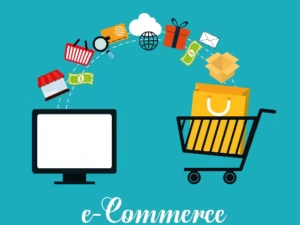The business world has undergone a massive transformation over the past decade, and at the center of this shift is eCommerce. As technology continues to evolve and consumer behavior moves increasingly online, eCommerce has become not just a convenience—but a necessity. In 2025, businesses that want to stay competitive, reach broader audiences, and grow sustainably must embrace the digital marketplace.
Whether you’re a startup founder or a long-established retailer, understanding the impact and potential of eCommerce is key to staying ahead. In this blog, we’ll explore why eCommerce is so vital in today’s business world and how you can leverage it to drive success.

What Is eCommerce?
At its core, eCommerce (electronic commerce) refers to the buying and selling of goods or services via the internet. It covers everything from retail giants like Amazon and Walmart to small, independent online stores. Transactions can occur through websites, mobile apps, social media platforms, and even voice-enabled assistants.
But eCommerce is more than just setting up a website. It’s about creating a seamless, engaging experience for customers, from product discovery to delivery and support.
Why eCommerce Matters More Than Ever in 2025
1. Shifting Consumer Behavior
Today’s consumers want convenience, speed, and personalization. Traditional brick-and-mortar shopping is no longer the default. Instead, people are turning to their phones and laptops to compare prices, read reviews, and make purchases with just a few taps.
According to recent industry data, over 65% of global retail sales are influenced by digital interactions. If your business isn’t online, you’re missing out on a massive share of the market.
2. Global Reach
One of the greatest advantages of eCommerce is the ability to reach customers anywhere in the world. Unlike a physical store limited by geography, an eCommerce website can operate 24/7 and serve customers across time zones and continents.
This global reach not only increases potential revenue but also creates opportunities to scale your business without the high costs of expanding physical locations.
3. Lower Operational Costs
Compared to traditional retail, running an eCommerce business can be significantly more cost-effective. You don’t need to pay for prime real estate, utilities, or as many in-store staff members. Inventory can even be managed using dropshipping models, reducing the need for warehouse space.
These lower overhead costs mean you can offer better prices, improve margins, or reinvest savings into marketing and customer experience.
4. Personalized Shopping Experience
Modern eCommerce platforms and tools allow businesses to offer highly personalized experiences to customers. From personalized product recommendations to tailored email marketing and abandoned cart reminders, these features increase engagement and conversions.
By leveraging AI and data analytics, eCommerce businesses can understand customer behavior and deliver the right message at the right time.
Key Components of a Successful eCommerce Strategy
1. Mobile Optimization
With more than 70% of eCommerce traffic now coming from mobile devices, having a mobile-friendly website isn’t optional—it’s essential. Your site should load quickly, display well on smaller screens, and provide a smooth checkout experience.
Tip: Use responsive design and test your site on various devices to ensure it works seamlessly for every user.
2. SEO and Content Marketing
Search Engine Optimization (SEO) is crucial for driving organic traffic to your online store. By optimizing your product pages, blogs, and images with the right keywords, you increase the chances of appearing in search engine results.
Tip: Combine SEO with content marketing—publish blogs, guides, and videos that provide value to your audience while subtly promoting your products.
3. Secure Payment Gateways
Trust is everything in online shopping. Make sure your website uses secure, well-known payment gateways like Stripe, PayPal, or Apple Pay. Also, ensure SSL certificates are installed to keep customer data safe.
Tip: Display trust badges and customer reviews to reinforce credibility.
4. Customer Support
Even online, customer service remains vital. Offering multiple ways for customers to reach you—like live chat, email, or chatbots—can make the difference between a sale and an abandoned cart.
Tip: Use automated tools for FAQs and order tracking, and have a responsive team for more complex issues.
Trends Shaping eCommerce in 2025
1. AI and Automation
Artificial intelligence is revolutionizing eCommerce through chatbots, personalized recommendations, inventory management, and dynamic pricing. These tools save time, cut costs, and enhance user experience.
2. Social Commerce
Social media platforms like Instagram, TikTok, and Facebook have integrated shopping features, allowing users to browse and purchase without leaving the app. This trend is booming among Gen Z and millennial consumers.
3. Sustainable Shopping
Consumers are more conscious than ever about where and how they shop. Eco-friendly packaging, ethical sourcing, and transparent business practices are becoming major buying factors.
Tip: If your brand supports sustainability, make it known. Share your values and efforts on your product pages and marketing materials.
How Small Businesses Can Compete in the eCommerce Space
It’s easy to feel intimidated by big brands dominating the eCommerce space, but small businesses can still thrive by focusing on niche markets, personalized service, and authentic storytelling.
-
Find a niche: Serve a specific audience that larger brands may overlook.
-
Build community: Use email newsletters, social media, and loyalty programs to build relationships with customers.
-
Invest in branding: A professional, cohesive brand builds trust and recognition over time.
Final Thoughts
In 2025, eCommerce is no longer a luxury or a backup plan—it’s a core component of modern business strategy. Whether you’re selling handmade products or running a multinational brand, going online opens doors to growth, innovation, and customer loyalty.
The digital marketplace is dynamic, but with the right tools and mindset, any business can succeed. Embrace the change, invest in your digital presence, and keep evolving with the trends. The future of business is online—and the time to act is now.
Want to launch or scale your eCommerce business? Contact us today for expert strategy, design, and marketing support tailored to your goals.
